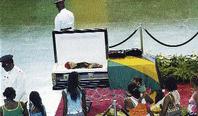Andre Jebbinson, Staff Reporter
Members of the public view the body of cultural icon, Louise 'Miss Lou' Bennett-Coverley, at the National Arena. - Norman Grindley/ Deputy Chief Photographer
Until 1962, the British monarchy, with all its pomp and pageantry, was the supreme power in Jamaica. Since Jamaica gained independence and formed its own government - some of the monarchy's traditions still linger and when state events occur a sense of pride and decorum abounds.
There was an ugly turn earlier this year when Opposition Leader Bruce Golding found himself without a seat at Prime Minister Portia Simpson Miller's swearing-in ceremony. But, despite that rare flaw, numerous hours of planning and coordinating are dedicated to state events. "You wouldn't know the amount of work that goes into planning these events. We actually have full rehearsal before the event to make sure things run smoothly. That is one of the secrets of these events," said Michael Nicholson, events specialist at the Jamaica Cultural Development Commission (JCDC).
Busy year
This year has been busy, what with a new Governor-General and a new Prime Minister taking their respective oaths of office, as well as several Cabinet ministers being sworn in. Also on the agenda was an official funeral for cultural icon, Louise 'Miss Lou' Bennett-Coverly.
Miss Lou was granted an official funeral because the Cabinet deemed her a significant Jamaican figure. By doing so, the Govern-ment assumed responsibilities for the undertakers' fees, hotel expenses for and transport for the VIPs from abroad, floral arrangements and other funeral details.
A funeral is usually held about two weeks after death, leaving much to be done in very little time. The planner must then set to work immediately. "Different responsibilities are given to different persons, depending on the level of the assignment," said Sandra Grant-Griffiths, chief of protocols in the Ministry of Foreign Affair and Foreign Trade. "Both sides are usually at the table to discuss and sign off on the agreement."
Bodies are almost always readied about two days before a state funeral, so as to allow viewing. A section of the protocol for official funerals states that "Lying-in-State will be for a minimum of 48 hours during which the Guard will be changed regularly, with members of the Defence Force taking their turns at keeping guard".
As is expected, family members, government dignitaries and other members of the congregation sit in separate areas. A key part of the ceremony is the sermon. "We don't tell them what to preach. We give them free reign and we expect that they would use their discretion," Nicholson said.
Tastefully done
The JCDC is usually consulted on items to be included on the programme. "The funeral is usually given to someone who has done something for the nation. The items usually relate with something the person done. For example, in the 'Tenky Miss Lou' concert, we went to groups that we knew were based on her work," Nicholson said. "It is expected to be good quality and tastefully done."
The Jamaican Defence Force conducts a state funeral, while an official funeral is conducted by the Jamaica Constabulary Force (JCF). State funerals are reserved for prime ministers and governors - general who die while they are still in office. National heroes and other VIPs, who the Cabinet sees fit, are also granted state funerals.
Members of the Cabinet, the president of the Senate and the spouse of a National Hero are some of the persons entitled to an official funeral. The last state funeral was that of former Prime Minister, Hugh Shearer.
According to Nicholson, the process works just the way it is right now. "It is not something
you can plan and put down, but
we learn from each other and so
we try to make it better each time," he said.

